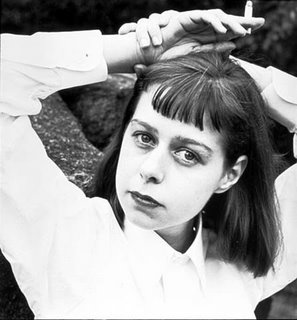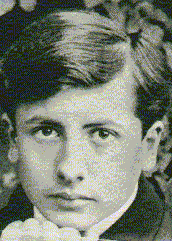INDEPENDENCE

Summer reminds me of Carson McCullers.
Odd, because I scarcely remember when I read her books, or where, much less the season.
I recall hearing about "The Member of the Wedding" from my sister. I think she wrote a book report on it in high school, probably because it's short. I remember thinking it was a romance novel and not reading it. Then I read "The Ballad of the Sad Cafe."
 A friend of mine, on whom I had more than a little crush, loaned it to me along with some other books — Andre Breton's "Nadja," Albert Camus' "The Stranger," "The Philosophy of Andy Warhol," and a book that, for lack of a better cliche, changed my life: "Le Grand Meaulnes" by Alain-Fournier, the French J.D. Salinger, who was killed in World War I.
A friend of mine, on whom I had more than a little crush, loaned it to me along with some other books — Andre Breton's "Nadja," Albert Camus' "The Stranger," "The Philosophy of Andy Warhol," and a book that, for lack of a better cliche, changed my life: "Le Grand Meaulnes" by Alain-Fournier, the French J.D. Salinger, who was killed in World War I.These books are all fantastic, but when you read them under the spell of infatuation, they are magical.
And that's how I conceived of Carson McCullers, as magical. After "The Ballad of the Sad Cafe," I ended up reading all of her books and short stories, some more than once. I must have been in my late teens when I read "The Heart is a Lonely Hunter," because it didn't impress me much that she wrote the novel when she was 22. Now, of course, I can't fathom it.
I read her "Reflections in a Golden Eye" sometime in college. Whenever I think of it now, I can think only of the bleak Marlon Brandon/Elizabeth Taylor movie of the same name. And I always get it confused with the Elizabeth Taylor movie "Who's Afraid of Virginia Woolf?" It's the same 1960s how-did-my-marriage-come-to-this? aesthetic.
I read a few of McCullers' short stories for college classes, and the rest later.
It was a long time ago. But all her writing has stayed with me — not as precisely remembered plots but as a feeling of melancholy that one might associate with autumn.
But she is a Southern writer. Like Flannery O'Connor. Eudora Welty. Harper Lee. Truman Capote. In the South, summer is the season of mellow fruitfulness. Not fall.
Summer is when all the marvelous children peopling these great Gothic novels sit around the kitchen table and yearn for something to happen.
And nothing ever does.
And that's the story.
And the tone is inevitably nostalgic. For nothing.
Oh sure, things happen. People get lynched. Neighbors feud. Flies buzz.
But mostly someone comes of age. Imperceptibly. Unassisted. Irretrievably.
And the poetry is always in the retelling, not the happening. As with the South itself.
As George and I were meandering through central Kansas last week, we came upon a sight that could have been in a McCullers novel because it was so striking and yet, in its own context, unremarkable. An older couple sitting in yellow metal chairs in the meager shade of their tiny house. It was 106 degrees, the middle of the afternoon. They waved at cars as they passed on the highway. We surmised that maybe their air conditioner was broken, or maybe they didn't have an air conditioner. Maybe this is how they kept cool, how they socialized. Maybe they spent the whole summer this way, like McCullers' characters: Frankie and Berenice and John Henry, sitting around the kitchen table, "saying the same things over and over, so that by August the words began to rhyme with each other and sound strange."
Or maybe the scene had nothing to do with their way of life. Maybe they were just taking a break from weeding the yard. Maybe they'd go out on the town later.
Something else that recently reminded me of summer and Carson McCullers: Neko Case's new song "Star Witness," which I've listened to a hundred times,
 partly because the refrain has a curious sexual rhythm — not like routine adult sex but like sex before you knew what it was like, sex as you imagined it as a teenager: enchanted.
partly because the refrain has a curious sexual rhythm — not like routine adult sex but like sex before you knew what it was like, sex as you imagined it as a teenager: enchanted. But mostly I listen to it for the lyrics leading up to the enchantment, which are about a little girl tripping on the sidewalk where tree roots have sundered it, like nature reclaiming civilization. The kid's pocket change falls out.
Trees break the sidewalk
And the sidewalk skins my knees
There's glass in my thermos
And blood on my jeans
Nickels and dimes of the Fourth of July
Roll off in a crooked line
To the chain-link lots where the red tails dive
Oh how I forgot what it's like
It's something McCullers would have seen significance in. A moment dense with meaning. Decaying order. Shattered glass. The weird freedom of summer, a sweet liberty constrained by thick boredom. Independence Day. Money. Blood. Birds who could fly anywhere but stay.
The difference between Neko Case and Carson McCullers is that McCullers would never have written "Oh how I forgot what it's like."
Because — this must have been her gift and her curse — she would never have forgotten what anything was like.

12 Comments:
I like to think that we gave that older couple a bit of nostalgia; they were waving at cars exploring the Flint Hills -- something they've done themselves many times. So now they are to content to sit and watch others follow their path, and they wave knowingly, sure that passers-by will have a good time.
Beautiful, kc.
You've captured my brief love affair with the South. It was all about waiting for nothing to happen, and it was enchanting.
But the nostalgia was lost on me. There's an old plantation house preserved just outside Tallahassee. I'd like to think it serves as a reminder against the Old South, but I know for many down there it's supposed to be a testament to how "great" things used to be. The enchantment wore thin.
Thanks, George.
The nostalgia, I think, is for an elusive moment — not so much the way things were, or even the way things were imagined to be, but for what might have been. I have that sense with McCullers, like there was a fleeting moment when something else was possible and the characters always live with that moment. And I have that sense with Neko Case, too.
(unrelated: have you seen pandora .com?)
I hadn't seen Pandora.com, but I'll have to take a look. Whenever I tell someone about music I like, I'm sure to say that "I thought it was cool," or "I really like it," not "It's great." I readily admit that I know nothing about music; I just know what I like. Maybe this will help me find more stuff to listen to.
OH gosh, this dude at work introduced me to Pandora today and I'm hooked. Too bad I'm at work!
OK, I'm hooked too.
Why does it feel so much more like a tragedy when a Southerner's virtues are corrupted?
Good question, cl. Maybe Southerners are just more dramatic.
Maybe there's a weather connection, as you offered on your blog to explain crazy Kansans.
Maybe it's because a good man is hard to find.
Get it? Get it?
Good one, cl!
“The Heart is a Lonely Hunter” and “The Great Gatsby” were two books that I read several times over several years. In each case, the details would soon fade from memory and I would be left with just a sense of a beautiful sadness that was much deeper than the plot. I couldn’t explain unless I went back and reread the story. I read “Gatsby” not so long ago. Maybe I should reread “Hunter”, and some of McCullers’s work that I have never reread. Glad you got me thinking about this, KC.
California summers don’t remind me of anything to do with the South. It’s hot as hell right now, of course. But nobody here is going to sit around and wonder if it is going to rain. It won’t. It is always dry, bright, and cloudless. My brother once described these summers as “plastic”. Nothing plastic about McCullers.
It smells a lot like engine oil
And tastes like being poor and small
And popsicles in summer
Post a Comment
<< Home